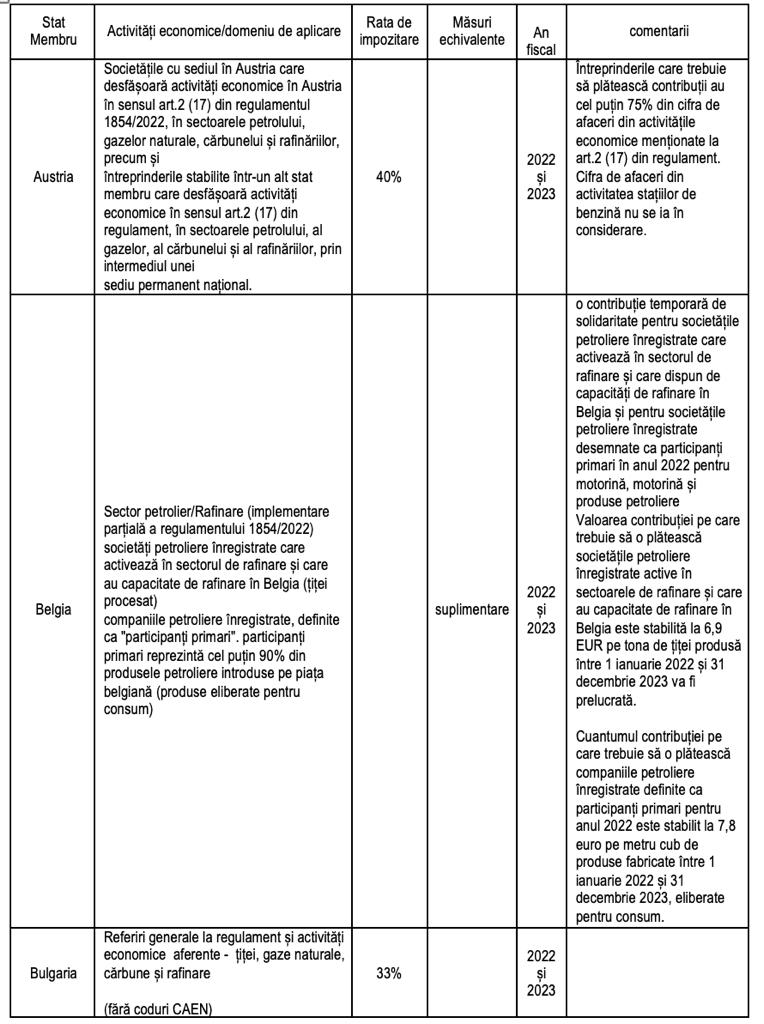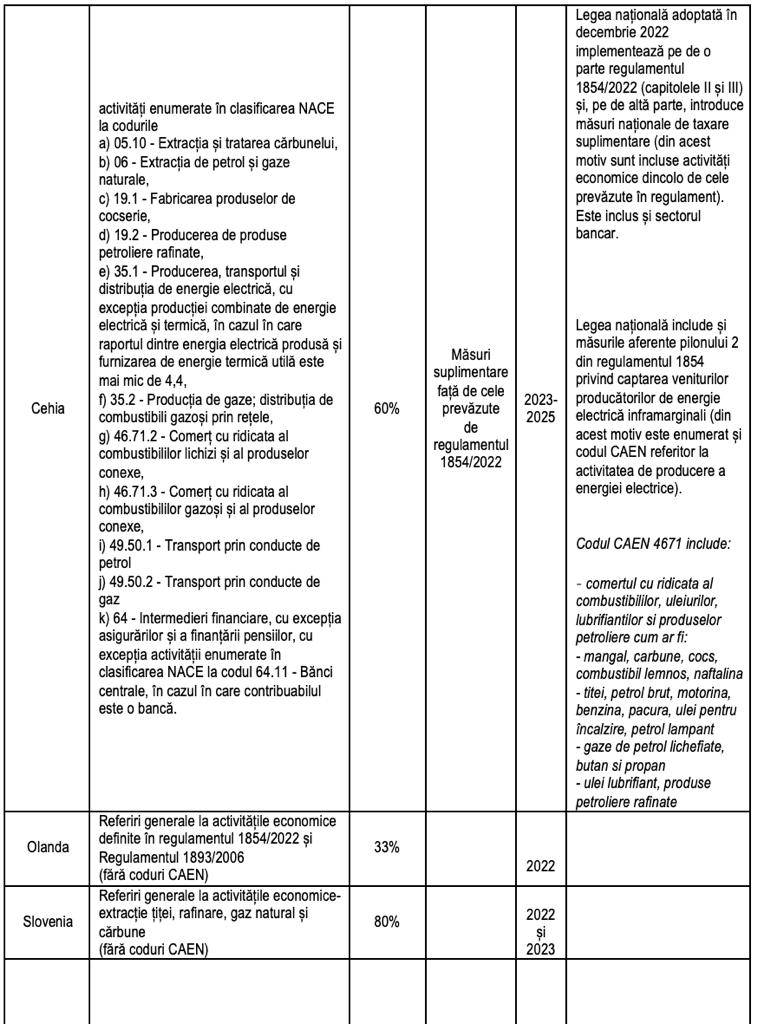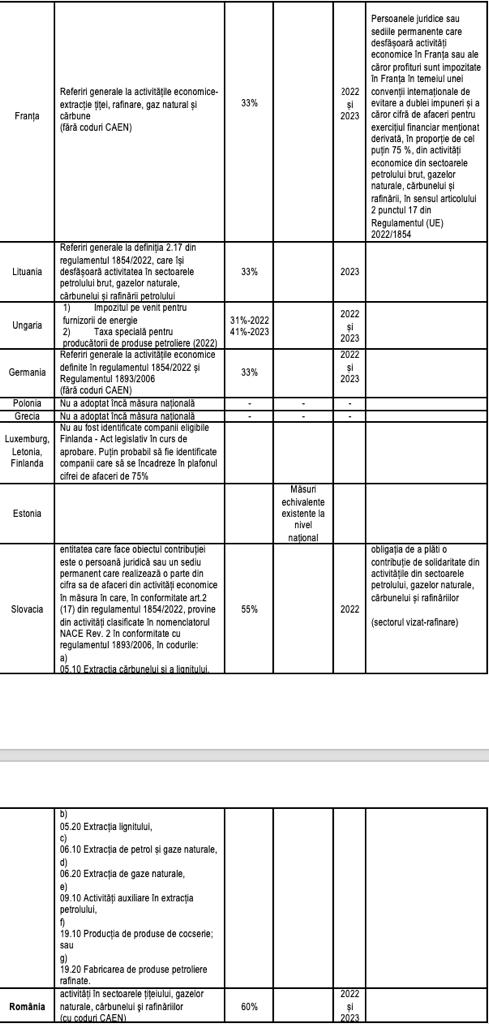
PNL and PSD point the finger because OMV does not pay solidarity tax. Marcel Ciolacu says the Ministry of Finance, led by PESED representative Adrian Caciu, has done nothing but implement what was agreed by the energy minister, the liberal Virgil Popescu. However, the Liberals point the finger at Cachiu for inserting the CAEN codes into the ordinance, which limits its use.
At the end of last year, the government passed GEO (186/2022), which will tax excess profits of crude oil, gas and refineries at 60%, introducing European regulation on this. According to the decree, the target groups are companies with 75% of their turnover in the sectors defined by CAEN codes: crude oil production, natural gas production, oil production, production of coking products and production of products obtained from oil refining. OMV announced at the beginning of the year that it does not fall does not fall.
According to the European regulation, the relevant companies are “Union companies and permanent establishments operating in the crude oil, natural gas, coal and oil refining sectors” means Union companies or permanent establishments that generate at least 75% of their turnover from economic activity in the fields , extraction, processing of crude oil or production of coking products”
Among the countries that transposed the provision, Germany, France, the Netherlands, Slovenia or Bulgaria did not specify CAEN codes in the legislation.
Here’s the current situation, according to an official analysis used by HotNews:



Marcel Cholaku blames the PNL
PSD leader Marcel Čolaku on Thursday accused the PNL of not paying the solidarity tax to the OMV.
“Regarding discussions in the public space about certain companies that do not pay the solidarity tax, the answer of the European Commission is as clear as possible: the Regulation has been transposed correctly and without any changes! The participant of the negotiations from the Romanian side was the Minister of Energy, who during the discussion of the Regulation did not ask any point of view from the Ministry of Finance. The Ministry of Finance has fulfilled what the Ministry of Energy agreed on, moreover, it requested the opinion of this institution regarding the GEO, which introduces the solidarity tax!” Çolaku wrote on Facebook.
Liberals say that there was no finance at the consultation in Brussels, and they had no questions at the second one
However, the Liberals say that the Ministry of Finance, led by Social Democrat Adrian Cachiu, is the responsible institution that should present a solution in the case of a solidarity tax for OMV Petrom.
The PNL press release notes that in December, the European Commission organized two series of consultations with member states on the solidarity tax, to which the Ministry of Finance, led by the PSD, was invited. At the first, the Ministry of Finance of Romania was not represented, and at the second it was present, but without clarifying questions regarding the specific case of Romania, states PNL.
“The Ministry of Finance, led by the PSD, must explain the reasons behind the four CAEN codes that it introduced in the regulation – and which limit its application – and why it did not choose the option for states that did not apply CAEN codes,” this is also shown in PNL press release.
Johannis announced that he was surprised
President Klaus Iohannis speaks in the same tone as the PNL. The Ministry of Finance must clarify whether OMV Petrom will pay the solidarity tax established by the emergency decree, the head of state said on Thursday, noting that the Ministry of Finance is the initiator of the regulatory act, which the Ministry of Energy reported. not informed
“Whether he will pay or not, you will be told for sure by those who made the regulations, that is, the Ministry of Finance. I was a little surprised when, after the approval, I learned how this matter was discussed and learned that, for example, the Department of Energy was not included in the discussion. This issue was discussed at the finance level, which is good in principle, because we are talking about a fee or a tax. (…) I believe that those who worked on the document should come and clarify it. Nothing is lost,” Yohannis said on Thursday.
The government asked the European Commission for clarification
In January, OMV Petrom announced that it would not pay the solidarity tax introduced by the government late last year with less than 75% of turnover in specified sectors: crude oil production, natural gas production, oil production and the production of refined products.
The European Commission has responded to the Romanian government, which asked for clarification after the Austrian company announced that it will not pay solidarity tax this year because it does not fall under the provisions of the regulation, having less than 75% of its turnover from the defined sectors: oil production, natural gas production, oil production and production of oil refining products.
PSD representative Radu Oprea said on Digi FM that the answer received from the European Commission shows that the threshold of 75% of turnover from taxable territories (crude oil extraction, natural gas extraction, oil extraction and production of derived products), from oil refining) cannot be reduced.
“The answer came from the European Commission, there are three points in the answer. The first refers to 75%, to this percentage of turnover, where the commission responds that by regulation this is the minimum that can be applied. So Romania applied the provision correctly, you cannot reduce it. The Commission’s second reply states that the five CAEN codes from the European regulation are correctly applied in the emergency regulation, and there is another question that says whether the products obtained as a result of processing, diesel fuel, gasoline, if they are included in these codes Here, the European Commission responds that they need more details to better understand the business model,” said Radu Oprea, quoted by Digi 24.
Kechiu demands payment from OMV
Finance Minister Adrian Caciu later announced OMV’s position that Romania had asked the European Commission for clarification on the application of the provision on solidarity contributions by companies that made exceptional profits during the energy crisis.
He added that if necessary, the emergency order adopted at the end of the year for the application of the European regulation will be changed to make all those who took advantage of the crisis pay.
“The government also introduced joint and several contribution, adopting almost everything written in the regulation, including elements that cause a number of elements of interpretation, namely the reference to at least 75% of turnover in certain sectors. The goal is this: those who have received exceptional profits and income from energy will pay in solidarity to offset the rising cost of living for both citizens and businesses. In order to avoid confusion, if you will, in the interpretation of both the regulation and the resolution, we have asked the European Commission to make an interpretation rule. From my point of view, everything is clear. Everyone will pay this tax,” Cachiu said on January 18.
Prior to the European Commission’s response, ANAF had started inspections at OMV regarding the solidarity tax, although it did not know whether the company had to pay it.
“ANAF has not made any report on the inspections carried out in OMV because we are waiting for clarification from the Commission as a result of the letter sent by the Ministry of Finance to clarify how the regulation will be applied. Only then will we complete this review and be able to say whether OMV complies with the terms of Decree 186,” according to ANAF’s Jan. 27 position.
Romgaz pays solidarity tax
Romgaz, on the other hand, will pay the tax: 906.1 million lei.
Romgaz is 70% owned by the Romanian state through the Ministry of Energy, and the rest by other shareholders (such as investment funds, pension funds or individuals). For example, NN Group owns 5.36%.
Source: Hot News
Lori Barajas is an accomplished journalist, known for her insightful and thought-provoking writing on economy. She currently works as a writer at 247 news reel. With a passion for understanding the economy, Lori’s writing delves deep into the financial issues that matter most, providing readers with a unique perspective on current events.